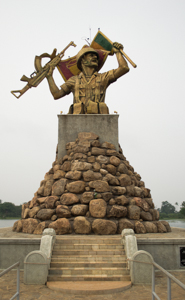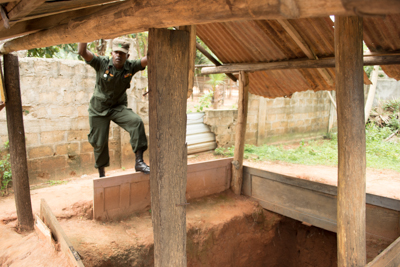
Societies around the world have been attracted to war and its aftermath, through the ages this fascination has grown as people strive to see what humanity is capable of. Now it has become a common practice for countries to portray their history of conflicts through an avenue known as "war tourism", an industry that is rapidly growing.
Tours of former conflict zones, memorials and the production of war memorabilia has left the moral dilemma of whether or not war tourism should go ahead. It fuels the accusations that this is merely a government profiting off death and destruction while, on some occasions, flaunting the fact that they were the victors.

War memorials are capable of flaunting a victory over the defeated populace
Opposition to this form of tourism describe it as possessing a victor mentality failing to take in to account the traumas suffered by those who endured such an experience. On the other side of the argument, promoters have suggested that humanity learns from its mistakes and hiding the past will not help.
When does this exhibition of conflict cross the line from remembrance to "lauding over the defeated"?
In Sri Lanka, following a thirty-year civil war, the government has taken upon itself to set up a war-tourism package in the northeast of the country where the final stages of the conflict were played out. Members of the civil society and foreign media have criticized the regime of being insensitive to the people of the region.
The Sri Lankan government is facing numerous allegations of war crimes, land grabs from the local populace and "Sinhalisation" of the Tamil regions of the country. Opponents to this form of tourism have described the regime as submitting to a victor's mentality; subjugating a populace to continuous reminders of their defeat. The idea that tourists are encouraged to come enjoy a relaxing holiday in a place where thousands have died is considered tasteless and aloof to the suffering of its inhabitants.
The recently constructed hotel accommodations alongside the Nanthi Kadal lagoon, where the final days of the war was fought, appears to have a crass feel surrounding it. Built on the land where it is alleged that hundreds perished, the government seems to have failed to take in to account the sensitivity of the issue.
However, this form of tourism does open a door for healing and closure for a society torn apart by war. The opportunity that a country has to move on is only provided when they longer hide the horrors of the past. The infamous Choeung Ek Killing Fields in Cambodia is one of the largest tourist attractions of that country.
A genocide museum, memorials, tours and exhibits are all on offer to educate the tourists on this bloody chapter in Cambodian history. While certainly a sight of great heartache for thousands of Cambodians, the authorities have ensured that it remains true to the history of the country taking in to account what the people suffered.
Similarly in Germany, war tourism is in abundance with the numerous sights on offer depicting the history of the rise and rule of Nazism. From Nazi party rally grounds to the concentration camps where thousands upon thousands of Jews, gypsies, homosexuals and any other group considered detrimental to the German race were killed, are on display -- an indication that the people of Germany have accepted their mistakes of the past, and are accepting them by refusing to hide.

The Nazi Party Rally Grounds in Germany
In Sri Lanka the issues surrounding war tourism is slightly more complicated with the industry being fueled by a regime that was directly involved in the conflict. While the sites on display clearly highlight the atrocities committed by the Tamil separatist group, they fail to account for the wrong done by the armed forces.
Tours of the former Liberation Tigers of Tamil Eelam, LTTE, headquarters including their leader's bunker and training grounds is an opportunity for civilians to get a clearer idea of what was happening behind the doors of this highly secretive group.
While being informative about both the ingenuity and horrors of this group, the tours being conducted by military personnel leaves a sense of wariness about what is explained. Although capable of providing a firsthand account of the conflict, the idea that those who directly fought against the LTTE would be unbiased is too much to expect.

Soldiers in Sri Lanka conduct tours of war memorials
The key to the acceptance of war tourism in other countries has been the time factor and the absence of a regime involved in the conflict. The memorials across Europe didn't become tourist attractions until the 1980s, ensuring the wounds of the wars have begun to heal. Similarly in Cambodia, the fact that the tours are being conducted under a regime that was not responsible for the atrocities ensure a more balanced presentation.
Sri Lanka's idea behind war tourism is well supported but it must be done in a manner conscious to the feelings of the populace. "History is written by the victors" is a phrase that can often be associated to a post-conflict country. As such, nations must be careful when promoting war tourism, ensuring that they do not blur the line dividing facts and propaganda.
